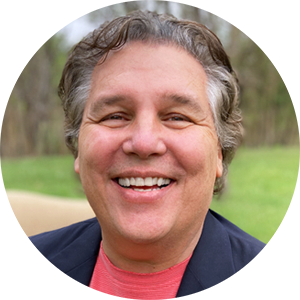
Why Did God Make Me this Way?
by Steve Siler on October 31st, 2022
“Why did God make me this way?” I knew the question would eventually come and I had prayed about how I would answer it. When my seven-year-old son with Spina Bifida finally asked me that question one evening as I was helping him in the bathroom, I gave him the only answer I could think of that was not a lie. “I don’t know, son.”
Of course, I could have gone into some theological rationalization and told him all about how God was going to use his infirmity to bless others—but in fact, He already had—as hundreds prayed for Henry for the weeks and months leading up to his birth and through the four years of surgeries which had followed. Somehow, though, I didn’t think that response would bring him much comfort. So, I decided to sit with him in the question. I decided not to minimize his pain. I decided not to explain away his disease by making it some part of a gigantic cosmic puzzle God was working.
I have come to believe we who call ourselves Christians are too quick to come up with explanations at times like these. I have also come to believe we do not place enough value in the ministry of presence: either our own or God’s. The only thing I know for sure is God loves us, cherishes us. I know He is present with us—on every mountaintop and in every valley. I do believe He is constantly at work—reconciling, redeeming, and working in and through us to make something beautiful out of our brokenness. I even believe sometimes God heals miraculously. I can’t explain it and, quite frankly, I don’t feel the need to. It’s not my call to make.
Many who prayed for our son before he was born prayed for a total healing. Some told us if we prayed hard enough and prayed the right things, he would be healed. To harbor any doubt would show a lack of faith and result in our son not receiving a touch by God. Now any parent will tell you they would dress in a clown suit and eat Brussels sprouts three meals a day if they thought it would mean their child would be healed. However, to add to the almost unendurable road of walking with a severely ill child, the potential for guilt because of thinking your lack of faith kept him from being healed—well, that’s bad theology, not to mention just plain cruel and something that leaves no room for grace.
The doctors at Vanderbilt University offered us a first-of-its-kind intrauterine surgery to repair our son’s spine. I wanted to do it. My wife didn’t. We decided to move forward and pray if it wasn’t the right choice, God would stop it. When we went in for the initial ultrasound, the doctors told us they were sorry, but the placenta had moved into a position that made the surgery impossible. Ultimately, we prayed for healing, but also prayed if he were not to be healed, we would have the courage to handle whatever came. After our son was born, we were relieved to find he didn’t have many of the complications that usually accompany Spina Bifida. He had no water on the brain and did not need a shunt. He would prove to be one of the rare kids with Spina Bifida who walks.
The people who qualified for the surgery and ultimately went through with it wound up with a child who did not do as well. Is that because we prayed more rightly than they did? Is that because we loved our child more than they loved theirs? Or because God loved our child more? I don’t believe any of those things. What I do believe is God hears prayer. What I do believe is God desires a genuine relationship with us. And what I believe most of all is that God is not afraid of our questions, and even our anger when we have to walk a crooked road.

Steve Siler is Founder and Director of Music for the Soul, a multi-award-winning ministry using songs and stories to bring the healing and hope of Christ to people in deep pain. Music for the Soul is a community of professional musicians, therapist, pastors, and ministry leaders committed to offering life-giving resources to those whose hearts are hungry for understanding, self-worth, wholeness, and peace. An accomplished songwriter and music producer, Steve has had over 550 of his songs recorded. He won the Dove Award for Inspirational Song of the Year with I Will Follow Christ. His nine #1 and 45 top-ten songs include Circle of Friends and Not Too Far from Here. Steve has spoken at the National Right to Life Convention, the American Association of Christian Counselors, and the National Center on Sexual Exploitation Summit among others. He has authored two books: The Praise & Worship Devotional and Music for the Soul, Healing for the Heart: Lessons from a Life in Song. See more at www.musicforthesoul.org/

Restoring Broken Relationships
by Eric Scalise, PhD on October 24th, 2022
When it comes to the brokenness seen in many toxic relationships, including a chaotic marriage, the road to freedom and restoration is often a process. Just as hurt and pain usually develop over a period of time, recovery and healing also tend to follow a progressive journey back toward stability. Here are four prescriptive steps that may offer some guidance, especially if you find yourself at the threshold of change . . . ready and hopeful that God has a better plan for the future.
Step 1 – Recognize and Admit: The Role of Confession and Breaking the Power of Your Secret
The first thing you must be willing to do is face yourself and do so with courageous, but brutal honesty—to say, “This may be about me, not the other person. I recognize and admit that I have a problem. In fact, I may be the problem. What do I need to do differently?” We often carry the “secret” of our struggle for years and the only thing we experience is the growing power it has over every aspect of our lives. Honest reflection is critical if you are to break through the fear and shame and take personal responsibility for what needs to be done. In 1 John 1:9, it says, “If we confess our sins, He is faithful and righteous to forgive us our sins and to cleanse us from all unrighteousness.” Confession requires bringing things into the light where they become visible (see Eph. 5:13). The child cries out at the, “monster under the bed” until the light is turned on. Only then, do we see things for what they really are. The same is true when it comes to our relationships. Bring them into God’s light where the Great Physician can perform the necessary surgery.
Step 2 – Clean Out the Infection: The Role of Grieving and Breaking the Power of Your Denial
The painful and/or distorted emotions within a broken relationship must be addressed and resolved so the potential for restoration and reconciliation can be released. Otherwise, sinful and destructive patterns will continue to have a negative impact on your life. These emotional wounds often become infected and infections have a natural tendency to spread. It may not be easy and it may not be pleasant—no infection is attractive—but the source of pain needs to be cleansed. Just a like a parent who must touch and gently clean out the scraped knee of their child, so too, God must be allowed to “touch” the sensitive, hurting and impaired places in our lives. And He graciously allows this to happen. David and Psalmists were constantly crying out before God and there was no minimizing or denying the reality of what they were wrestling with. Psalm 62:8 says, “Pour out your heart before Him; God is a refuge for us.” Only then can a healing salve and bandage be applied. When we turn to God with our greatest fears and our deepest griefs, we will always encounter the safest hands.
Step 3 – Renew the Mind: The Role of Truth and Breaking the Power of Your Unbelief
A wrongful and unbalanced belief system usually contributes to codependent relationships. How you think about your relationships and the beliefs you carry may have so distorted the truth, you are now bound by the lies that you actually live. The enemy of our soul is a liar and a deceiver, but the ability of God’s Word to give discernment, clarity, direction, hope, wisdom, and changed thinking are evident. We are transformed by the renewing of our minds (Rom. 12:2) and the washing of His Word (Eph. 5:26). Just as the rain softens the ground and we can more easily weed the garden, in the same way, truth has a way of softening our “heart ground” and allows God to remove the things that tend to choke out life. He is a faithful gardener, but when our hearts are hard and closed, He usually just gets what’s at the surface and not down to the root of the matter. Allow His grace and truth to wash over every part of who you are. The result will be new life and not only that, but one of greater abundance.
Step 4 – Exercise the Will: The Role of Accountability and Breaking the Power of Your Fear
While owning the problem, addressing damaged emotions, and having a renewed mind are all important, by themselves, they are not enough. Concrete and proactive steps must be taken through confession, repentance, obedience, and accountability. Every journey really does begin with a first step. Committed action is usually the result of strong conviction. It’s the evidence that indicates we are ready to move on and beyond the past. The Apostle Paul told the Philippians he was, “forgetting what lies behind and reaching forward to what lies ahead” (3:13). The truth, however, is that most of us cannot do it alone—we need someone to walk with us. A friend once told me that accountability is the breakfast of champions, but too many of us skip the most important meal of the day. Isolation is Satan’s primary tactic to take out any believer. We just become easier targets. In 1 Kings 4, we see a description of Solomon’s key officials. Embedded in this list is a priest named Zabud, who is called, “the king’s friend” (NASB). Here is the wisest man who ever lived, who had the insight to have someone part of his inner circle who apparently served the primary role of friend. Who is your Zabud? Find that person and ask them to prayerfully consider taking this journey with you—not as an enabling deterrent, but as an accountability partner.
God is an expert at mending broken hearts and broken relationships. Yet, it’s within the brokenness where He can usually be found and where He draws the closest to us. “The sacrifices of God are a broken spirit; a broken and a contrite heart, O God, You will not despise” (Ps. 51:17).

Eric Scalise, PhD, currently serves as President and Chief Strategy Officer (CSO) with Hope for the Heart and is also the President of LIV Consulting, LLC. He is the former Senior Vice President for the American Association of Christian Counselors (AACC) and former Department Chair for Counseling Programs at Regent University in Virginia Beach, Virginia. Dr. Scalise earned his doctorate in Organizational Leadership, is a Licensed Professional Counselor, a Licensed Marriage and Family Therapist, and a Credentialed Master Life Coach with 44 years of clinical and professional experience in the mental health field. He served six years on the Virginia Board of Counseling under two governors. Specialty areas include professional/pastoral stress and burnout, combat trauma and PTS/PTSD, marriage and family issues, grief and loss, addictions and recovery, leadership development, and lay counselor training. As the son of a diplomat, Dr. Scalise was born in Nicosia, Cyprus, and has also lived and traveled extensively around the world. He is a published author (Addictions and Recovery Counseling and Lay Counseling: Equipping Christians for a Helping Ministry), adjunct professor at several universities, conference speaker, and frequently consults with organizations, clinicians, ministry leaders, and churches on a variety of issues.

The Power of Your Unseen Life in a Seen World
by Bethany Murdock, BA on October 17th, 2022
If there was ever a time to grab the heart of God wholeheartedly, I believe NOW is that time! Obviously, there is never a time when we won’t need to lay hold of Jesus with all that we are. But right now, as we speak, these are significant days. These are days of acceleration in the Spirit. Truth be told, these are the days that so many of the believers who have gone before us prayed for. We are standing in their answer to those prayers . . . a very amazing thought for sure. Because the “baton” is in our hands, the stance of the people of God needs to be one of urgency about every area of our lives because the time really is short.
No matter what your journey looks like right now as you read this, God has the word “Assignment” over your life. If you are in business or ministry or raising a family, whether you are married or single, young or old, there is a God-given assignment for you. A plan and a beautiful purpose! God wants “All hands-on deck” and that means you and me. With this thought in mind, I believe we need to be praying, “What are You asking of me right now Lord? How can I serve and lead at the highest level possible in Your eyes? And for that matter, what do You consider ‘high level’?” After all, the Bible does ask the question, “What will it profit a man (or woman) if he (or she) gains the whole world, and loses his (or her) own soul?” Things are not always as they seem.
Truth in the Unseen
One of the loudest clarion calls going out across the earth from the people of God should be what David prayed in Psalm 51. He prayed, “Surely you desire truth . . . in the inmost place.” Who we are in the unseen world, in private, NOT visible to others or the public “us.” This is where God is asking for truth. It is here that Jesus wants the greatest access to our lives. The world insists we place our focus and energy on what is seen. As a result, whether we like it or not, this mentality can easily creep into our hearts, and the shift is never a good one when it does. In both the Old and the New Testaments, we see evidence that God is primarily looking at what people don’t consider important. We see this principle when Samuel was looking for a new king to anoint in place of Saul. Everybody, including Samuel, the prophet of God, got it wrong!
“When they arrived, Samuel saw Eliab and thought, ‘Surely the Lord’s anointed stands here before the Lord.’ But the Lord said to Samuel, ‘Do not consider his appearance or his height, for I have rejected him. The Lord does not look at the things people look at. People look at the outward appearance, but the Lord looks at the heart.’” (1 Samuel 16:6–7)
Things are not always as they seem. People are not always what they seem to be. We are not always who we seem to be. In the New Testament, we see God reminding us in 2 Corinthians to “Fix our eyes not on what is seen, but on what is unseen. For what is seen is temporary, but what is unseen is eternal.” Grabbing the heart of God for your life, business, marriage, home, and any relationship you have, is born out of understanding the way He thinks. We get used to placing the biggest value on the way things “look.” My friends, God does not want things that “look” good; He wants things that are Good. Thank God He doesn’t just look good; I am so thankful He is good!
Perhaps even as you are reading this, you realize your focus has shifted to the seen. Maybe you realize you value what you can see more than what you cannot, even yourself (not realizing the hidden life directly impacts the public life). So, if this has become the way you think, you may be experiencing insecurity, fear, striving (trying to keep things looking good), and probably some very real exhaustion. Why? Because at any moment, the “seen” can change. Don’t be discouraged if you are having this revelation about yourself. Jesus will help you make the shift.
The unseen can be the most stable or unstable part of who we are. I live in Virginia Beach, Virginia. We have these trees here called nesting pines. They grow very tall, very fast. They look mighty, but as soon as a Nor’easter or tropical storm comes through, can you guess what tree falls first? The nesting pine. Why? It has extremely shallow roots. When push comes to shove, the deceiving height is no match for the winds and the storms because its unseen roots are so shallow. The seen was no match for what the tree lacked in the dark, unseen places.
Time with God
It is the unseen, your foundation, where the most important work takes place. What happens here will result in an easily destructible life or an indestructible life. Never mistake the unseen for the unimportant. It is actually the most important place to spend your time. What does that look like? Spending very real, daily time in the Word of God. Not just reading, but stopping to process it and asking God, “What are you saying to me today, Lord?” How do we know what God might want to change in us or what ideas He might want to download to us or in what ways He wants to encourage us if we never spend time with Him to listen to what He says? How will we ever truly execute in the “natural” world around us if we never prepare in the Spirit?
Without fail, focused time with Jesus always translates into lasting progress in our lives and our journeys. If you feel too busy to spend time with Jesus, then you are too busy not to spend time with Jesus. How can we work off an empty spirit? A crash is on the horizon if we let it go for too long. How else can I look after my unseen life? I can actively go after people who are further along than me and open myself up to them, allowing them to speak freely and honestly to me about what they are seeing in me. Maybe there are things I am blind to; maybe there are things I need to face honestly about myself. Invest in a coach or see a pastor or even a therapist if it’s warranted. It is worth the journey and that is why we are here. Oh . . . and those of us who do coach and lead others actually have an even greater responsibility to stay healthy in this unseen space. I have a coach myself and (take a deep breath) a therapist too! What I am able to give because of practicing what I preach here is of far greater value because of it. There is no shame in keeping watch over your own soul.
Jesus is the Goal
Be encouraged today, especially if you find yourself in a season where you feel hidden or unseen. You are not hidden or unseen to God. Jesus loves what He is doing in you in this place, and it is the most worthy place. The unseen is not a punishment. Because the seen is not the goal. Jesus is the goal and the prize we reach for. “Let patience have its perfect work, that you may be perfect and complete, lacking nothing!”(James 1:4)
Thank Him for the work He is doing inside of you. It will be the making of you! If you are in a very visible and public place right now, humbly remember that it is temporary. The work you do in the unseen will take you beautifully into the seen and then right back into the unseen for more worthy work by God in you for the days to come. God does not use the seen and unseen as rewards and punishments. So, don’t let your heart value anything that is temporary over the priceless and eternal reward that comes from being found faithful. Be faithful in every season of your life. God is moving and He is using you. Remember and never forget, the goal is Jesus.

Bethany Murdock, BA, is a Master Life Coach certified through the International Christian Coaching Association (ICCI) and the American Association of Christian Counselors who regularly coaches individuals and couples. She is also an ICCI Board of Reference member. Bethany has been in ministry for over 20 years, has served as a Worship Pastor, and is ordained. She has been helping people grow and develop in both their personal lives, as well as their relationship with Christ. Her desire is to see people empowered through Jesus and to live their best life possible. Her areas of expertise include Life Coaching for Women, Marriage Coaching, Grief and Loss Coaching, Spiritual Development Coaching, and Leadership and Ministry Coaching. Bethany and her husband, Paul, reside in Virginia Beach, Virginia. See more at www.bethanylentzmurdock.com

Four Strategies to Motivate Your Team for Lasting Results – Part II
by Dwight Bain, MA on October 10th, 2022
Avoiding Hidden Pitfalls
Now you and your team have the basic career coaching strategies needed to win at work. Yet, even with these insights, many people are afraid to try and often give up on the belief they could have a better life by moving from what I call their “day job” over to fully experiencing their “dream job.” Why do they lack career confidence? Why are they still likely to fail? Three possible causes are that they are fearful, frustrated, or failing.
- Fearful
Times are tough and many people are afraid about what the economy will do in the future. In fact, they can become so frozen in fear, they are afraid to try. It’s normal to feel afraid, yet when you are overwhelmed with fear, it can often lead to becoming indecisive and totally zoning out. Since running away from reality feels easier than facing it for some people, they choose to stick their heads in the sand and completely deny what’s happening to their industry. Think about how Blockbuster Video failed to make strategic changes with their customers and eventually filed for bankruptcy protection, while competitor organizations like Netflix and Red Box were capturing greater market share and thriving. Some people retreat in a passive way and just slowly sink, while others try to avoid reality by using substances or media outlets to escape. Avoiding major change by hiding in fear often lead to a major crisis. Being aware of these dangers and opening up the conversation with your clients by asking tough questions will help them protect themselves when they are heading toward a dangerous situation.
- Frustrated
People often think they are frustrated with marriage partners or coworkers, but the conflict is often more about them. Help clients think about the times they were trying, but it just didn’t come together. They knew they wanted to finish strong and have a meaningful career, but they felt like they lacked the horsepower to really pull out in front of the crowd. When frustration builds up, it puts people at great risk because they face tough choices . . . finish with mediocre results and risk getting laid off, downsize to try again at the next job or just check out to avoid feeling the pain of not performing to their potential and quit. I have especially seen this with highly creative or bright coaching clients who procrastinated until the last minute and then could not finish projects needed to move forward. Their frustration often comes out as anger directed toward the closest person to them. It’s not fair, but it happens because they let the frustration take over, which blocks their ability to win at work.
- Failing
Sadly, a failing, unmotivated person is the easiest to spot because they checked out a long time ago. When someone has reached this level, they are so unmotivated, they give up on even trying at the most basic of tasks, so their resume just reflects a free fall down to zero. They totally and completely fail, which crushes their confidence. For many, failure kills the desire to try again, which leads many coaching clients to give up completely and just drop out on the idea that a meaningful career was ever even a possibility for them. They are too depleted even to believe God’s promise, “Call to Me, and I will answer you, and show you great and mighty things, which you do not know” (Jeremiah 33:3, NKJV) might still be available to them.
Consider sharing with your team members who are stuck how you have used the truth of Scripture to face fears, frustrations, and the fear of failing. Using timeless words of encouragement from God’s Word and then using those truths to spark meditation with insights from the Bible is a way toward deeper peace and strength. I believe this pattern will guide each member of your team fear to greater faith by identifying core motives, and then translating that into the powerful motivation needed to win at work.
Application to Build Greater Motivation
You and your team are stronger than you think, but just in case you are feeling beat up by life, listen to the words of Moses in Exodus 14:13-14 (NKJV) as a final challenge when you or your team members are feeling unmotivated or scared about work or careers: “Do not be afraid. Stand still, and see the salvation of the LORD, which He will accomplish for you today. The LORD will fight for you.”

Rolfe Carawan, MEd, is the President of LifeMatters Ministries, which focuses on discipleship, biblical principles, and tackling relevant issues of our times, and is also the Co-Founder of Carawan Global Group. Inspired by his passion to relieve suffering and release potential, Rolfe brings his real-world experience and strategies to individuals in every walk of life. Known for his contagious enthusiasm, his coaching draws out the best in people, igniting a renewal of energy, engagement, and productivity, as well as successfully transitioning people through change, transforming human behavior, strengthening relationships, and overcoming generational gaps. His winning strategies have been developed over 30 years of successfully coaching, training, and motivating people. Speaking to organizations ranging from Fortune 500 and high-tech companies to healthcare and nonprofits, Rolfe has spoken to nearly a million people throughout America, as well as audiences on four continents. He is an author (Profiles in Character and Character Revolution), successful teacher, coach, trained counselor, and uses experiential learning methods to create healthier relationships at home and work, effectively implement change, and strengthen communication. Rolfe has worked and volunteered his services in a number of countries including Brazil, Ghana, Israel, Ukraine, Russia, Canada, and Mexico. He currently on the Board of Reference for the International Christian Coaches Institute (ICCI) and is a Certified Transformed Living Coach Trainer™. See more at www.transformedliving.org

Lea Carawan, MA, is the founder of Transformed Living, a ministry that provides Bible-based resources and services designed to make disciples who love God, walk in freedom, and build life-giving relationships at home, work, and play. She and her husband, Rolfe, built a successful speaking, coaching, and consulting firm serving organizations ranging from Fortune 500 and high-tech companies to healthcare and nonprofits. For nearly 20 years, they helped leaders implement winning strategies that brought out the best in people. Lea was the cofounder and served as the Executive Director for the Congressional Prayer Caucus Foundation. For over a decade, she led the effort to equip and mobilize the largest network of federal and state elected leaders—nearly 100 sitting members of Congress and 900 state legislators—who are committed to standing for faith and implementing proactive strategies to advance religious freedom, prayer, and America’s Judeo-Christian heritage. She is a speaker, consultant, ordained minister, and multi-certified life, relationship, and spiritual formation coach and trainer. With a career spanning three decades, Lea has transitioned seamlessly between entrepreneurship, fashion, consulting, ministry, and motherhood. Lea has been a frequent speaker at women’s meetings, conferences, and marriage retreats around the world, including countries such as Brazil, Ukraine, and the United Arab Emirates. Lea is currently on the Board of Reference for the International Christian Coaching Institute (ICCI) and a Certified Transformed Living Coach Trainer. See more at: www.transformedliving.org

Four Strategies to Motivate Your Team for Lasting Results – Part I
by Dwight Bain, MA on October 3rd, 2022
What Does it Take to Win at Work?
People have asked me that question dozens of times after a keynote speech or radio talk show. Most likely, your team members have asked you the same or similar questions. They want to know what action is needed to build a successful life instead of being trapped in long-term failure. This is a great question. Unfortunately, since every person faces different challenges, there isn’t a 100-percent-specific answer that works for every person. A better approach is to guide your team in focusing on the real source of motivation by exploring their underlying motives. When you discover the motive behind why they want to win at work, you will be on track to help them shape a strategic approach to speed toward accomplishing goals and avoiding distractions that lead to failure.
Key Questions to Ask Your Team
- Do you want to win at work to deepen your resume to advance your career?
- Does success at work mean making more money to bring home to your family?
- Does career success give you personal meaning and fulfillment?
- Does winning bring you a sense of satisfaction by proving you are the best?
Greater professional success usually gives a person far greater options in their personal life because increased income brings the flexibility to solve problems and control schedules by delegation. Outsourcing to save time and money is a wise use of resources. Working harder to gain greater self-esteem, however, is a dangerous motivator because it takes major sacrifices of time and energy and can often become a black hole of busy activity leading to workaholism.
Career burnout comes from attempts to fill up deep emotional insecurities through aggressive professional activity. Burnout will not lead to professional success, and sadly, is incredibly common among people who have not seen the importance of mapping out a realistic career plan to win at work without losing at home.
Finding the Energy for Career Success
So how can your team stay motivated to achieve greater career success? Have them start by identifying their core values, which can be identified through mapping out their internal motives, since motives lead to motivation. Here are four key areas I use to inspire business professionals I have coached to stay focused to win at work while feeling greater energy and fulfillment in the process: Insight, Interests, Importance, and Identity.
- Insight
There is a Scripture verse I was taught to pray every day: “If any of you lacks wisdom, let him ask of God, who gives to all liberally and without reproach, and it will be given to him” (James 1:5, NKJV). When you know you don’t have the answers, then asking for God’s direction is a wise use of time. Generate insight by asking God to reveal the gifts and natural abilities of each member of your team, regardless of how much they may feel like they are struggling. Everyone has talent and ability at something. It takes insight as a wise leader to see it, and then it takes courage to stay focused to light the fire of desire in their heart, especially when you or they may feel like giving up. Have your team members enlist people close to them, like a marriage partner, family member or trusted friend, to help identify their talents and abilities if they don’t already know them. Since these people already know so much about their loved ones personality, character, motivation, and inner-drives, they are more likely to speak truth when given the freedom to do so. Asking many questions to gain greater insight will protect against impulsive choices, and insure a greater likelihood of success. So don’t be afraid to ask too many questions, but do be afraid to stay silent on this important element.
- Interests
Once your team know their gifts, talents, abilities, and skills, the next step is to see how those unique gifts could be transferred into something so incredibly interesting that they want to show up and learn more about it every day. There is an old saying that the curious are never bored, which is true. When your clients are inspired about pursuing something extremely interesting, they will lose all track of time because they are so engrossed by what is before them. Linking their interests with greater insight leads to the next part of the process to win at work.
- Importance
Once teams are inspired to pursue the most interesting aspects of their jobs or career callings, the next element to stir up personal motivation is to help them discover what is most important. What is valuable to them? What has great meaning? What activities or organizations do they believe in strongly? Everyone believes in something, yet many of us have not taken time to explore and discover the core motives that fuel our desires to create positive change. Now that you have mapped out the key areas that motivate people you are ready for each member of your team to advance to the final stage.
- Identity
When people figure out who they are and what they enjoy doing, they are on track to live out their purpose and have more fun in the process! Perhaps the huge success of many work-related reality TV shows (like American Idol) is because they reveal what many people secretly would like their daily work experience to be—a place that allows them to utilize their creative abilities in an environment that rewards big risk-taking to achieve greater results. It’s not hard to stay motivated when you know why you are going to work, and it’s not hard to stay in the race to win, either. In fact, it makes it easy to move from a fear of failure to moving forward with a new dedication to finish strong!
Dwight Bain, MA, is the Founder of the LifeWorks Group in Winter Park, Florida. He helps people rewrite their stories through strategic change and is dedicated to helping people achieve greater results. Since 1984, Dwight has helped thousands of people across America as a Keynote Speaker, Certified Leadership Coach, Nationally Certified Counselor, and a Critical Incident Stress Management expert. He is a trusted media resource on managing major change and has been interviewed on hundreds of radio and television stations, has been quoted in over 100 publications, and is the author of Destination Success: A Map for Living Out Your Dreams. See more at: www.dwightbain.com

The Mighty Sequoia: A Mustard Seed of Faith
by Eric Scalise, PhD on September 26th, 2022
The Scriptures tell us that God reveals Himself in many ways, “For since the creation of the world His invisible attributes, His eternal power and divine nature, have been clearly seen, being understood through what has been made…” (Rom. 1:20).
Some years back, my wife and I, along with our two sons, took one of those vacations that provide a lifetime of memories . . . after flying to Denver, we spent three weeks driving all over the western United States. We put enough miles on the rental car that I had to do an oil change before returning the vehicle. The itinerary included Mount Rushmore, Devil’s Tower, the Grand Tetons, Yellowstone, the Colorado River, Pike’s Peak, the Grand Canyon, the Rocky Mountains, and Yosemite. We hiked, climbed, did some whitewater rafting, and filled our photo albums. However, for me, the highlight was our time together in Sequoia National Park. It was here, in the midst of God’s beautiful creation, that I finally understood the power of a seed.
The Sequoia is part of the redwood family and only found in the coastal forests of southwestern Oregon and northern California—growing at elevations above 5,000 feet on the western slopes of the Sierra Nevada Mountains. These giants of the forest are the largest living things (by mass) in the entire world—weighing in at an astonishing one to three million pounds when they reach maturity. They thrive in cold snowy winters and can drink thousands of gallons of water every day. Sequoias grow up to 300 feet in height and can be 20-40 feet in diameter. Many would grow taller if not for lightning strikes that strip off their tops. The bark alone is three feet thick!
Imagine for a moment standing at the base of one of these enormous trees and looking upward. The closest thing to it might be trying to see the top of the Statue of Liberty from the ground, which is also around 300 feet tall. It’s almost impossible to take a picture in one frame. I know; I have four rolls of film of bark and tree trunks. There are a few places in the park where you can drive a car through a tree if you so desire. Yes, it’s that amazing.
Sequoias are among the oldest living things in the world with several trees estimated to be approaching 3,500 years in age. My family and I stopped at a ranger station and saw a slice of a downed tree. There were map flag pins stuck on various tree rings with historical dates. I remember seeing the one for the signing of the Declaration of Independence in 1776. Then there were tree rings representing the Pilgrim’s landing at Plymouth Rock in 1620, Columbus’ arrival to America in 1492, the signing of the Magna Carta in 1215, the first Crusade in 1096, the Council of Ephesus in 431, the destruction of Pompeii in 79, Caesar crossing the Rubicon in 49 BC the death of Alexander the great in 323 BC, the birth of Socrates in 490 BC . . . the events and the dates were mindboggling. I was literally seeing the history of the world being told in the rings of a tree trunk.
Walking away from the ranger station, I convinced myself that I simply had to have a cone from one of those trees. I wanted to put it on my fireplace mantle at home, just to reflect on how amazing God’s creation truly is. I looked everywhere for a Sequoia cone, but couldn’t find any. I figured the other tourists had beaten me to it and already picked the forest floor clean. There had to be a gift shop somewhere that sold them…the price didn’t matter. Then someone showed me what a cone actually looked like. Placing the treasure in my hand, I was stunned to see how tiny in comparison it was—only about three inches in length… fully grown. Sequoia cones don’t even appear until the twelfth year and then take another eight years before they begin to open. Every cone contains about 230+ seeds, each one about the size of the period at the end of this sentence. An adult tree can have as many as 11,000 cones and drop up to 400,000 seeds in a given year. In its lifetime of 3,500 or so years, one Sequoia will drop almost one and a half billion seeds.
All of a sudden the parable of the mustard seed in Matthew 13 and 17 was beginning to make sense. How much like God—in character and nature—is the mighty Sequoia. Yet, there is more. Sequoias are extremely fire resistant and scientists now know that fire is actually critical to the life of the tree—it facilitates the release of the seeds and helps them germinate. Fire brings life! These massive monuments also have one of the shallowest root systems of any tree known to man. There is no tap root and even though the root system may cover an entire acre, it only penetrates 12-14 feet deep. One must wonder how they manage to stand with nothing to anchor them in the ground. The key is that Sequoias are only found in groves… never alone… only in community. If you had the ability to peer below the surface of the ground, you would see that the roots of all the trees in the grove are intertwined, locked together and holding each other upright to support the incredible weight above.
You may ask: “What lessons can be learned here? What do trees have to do with relationships, the Church or one’s legacy?” The metaphors are numerous.
I see the Body of Christ as the soil God has provided (see Matt. 13:18-23) for every faith community that calls upon the name of the Lord—the seeds are like children, our talents, our time and our treasure—a legacy of God’s faithfulness across generations. As the passage unfolds, we see that those who hear the Word and understand it will bring forth fruit, some a hundredfold, some sixty, and some thirty. The fiery trials of life often do come, even in the household of faith, but as God promised Isaiah, “When [not if] you walk through the fire, you will not be scorched, nor will the flame burn you” (43:2). Finally, we are all connected as members of one body—the Body of Christ—intertwined and holding one another up before the throne of grace.
In closing, let me encourage you to take whatever seed God has given you and plant it in faith in whatever ground He has given you. May it yield a billion and a half times in return, for, “If you have faith as a mustard seed . . . nothing shall be impossible to you” (Matt. 17:20).

Eric Scalise, PhD, currently serves as Senior Vice President and Chief Strategy Officer (CSO) with Hope for the Heart. He is also the President of LIV Consulting, LLC, the former Senior Vice President for the American Association of Christian Counselors (AACC) and former Department Chair for Counseling Programs at Regent University. Dr. Scalise is a Licensed Professional Counselor and a Licensed Marriage & Family Therapist with over 42 years of clinical and professional experience in the mental health field, and he served six years on the Virginia Board of Counseling under two governors. Specialty areas include professional/pastoral stress and burnout, combat trauma and PTSD, marriage and family issues, grief and loss, addictions and recovery, leadership development, and lay counselor training. He is a published author, adjunct professor at several Christian universities, conference speaker, and frequently works with organizations, clinicians, ministry leaders, and churches on a variety of issues.

Where in the World Are These Women? – Part II
by Alita Reynolds on September 19th, 2022
In Part I of this blog, I closed by asking the first of three questions.
- What does a godly friend look like?
Now, let’s look at the other two questions.
How can I BE a godly friend myself?
I started by praying for God to transform me into the woman who would be the wonderful friend I was looking for in my life. I think the key word here is “transforming.” I cling to Romans 12:2 because it says, “Don’t copy the behavior and customs of this world, but let God transform you into a new person by changing the way you think. Then you will learn to know God’s will for you, which is good and pleasing and perfect.”
We have the opportunity to be just a little bit better every day. The process of transforming does not happen overnight. We take one little step to become the woman God created us to be. We won’t ever arrive at perfection, but when allowing God to do the work in us, we become more and more like our Creator and become more and more like the friend we have in Jesus.
What does a godly friend NOT do?
I shared previously how I have had failed attempts to create godly friendships. Developing real, raw, authentic friendships requires vulnerability, and sometimes this vulnerability is taken advantage of. I probably did not have to tell you because you have most likely experienced this hurt for yourself. When I was betrayed by a woman who seemed to be “very godly,” the sting hurt worse. I said I would never be that vulnerable and open or real with anyone ever again. Well, that lasted a few months. Never is a pretty strong word. I was just so hurt I did not want to feel that pain again, but clearly, deciding I would not be vulnerable ever again was not the solution. I eventually healed from the pain of betrayal, and then I tried again.
Godly friends do not betray their friends. Godly friends do not stay distant from all meaningful relationships. Here’s the deal: I learned a lot from this betrayal. Was it right for her to betray me? Absolutely not. Was it good for me not to engage in any more deep, meaningful relationships? Absolutely not.
Godly friends dig in. They invest their time and energy to create authentic relationships. Does this mean that as godly friends, we are to have weak boundaries and allow others to hurt us negligently? Also, absolutely not. However, when we establish healthy boundaries, we have the opportunity to invest in our relationships, and yet, if necessary, withdraw from the close friendship to protect ourselves.
How we engage in relationships with our inner circle, those closest to us, is more vulnerable and intimate than how we engage in relationships with more distance. Remember, just because a friend was once in your inner circle does not mean they will always have that level of closeness or trust. Usually, your inner circle consists of three to five of your closest relationships.
We have an opportunity to love and care for friends while maintaining more distance between each other to protect ourselves when required. We also have the option to sever unhealthy relationships if needed. Sometimes it feels harsh or even selfish to end a friendship, but sometimes it is needed. Ecclesiastes 3 encourages us that there is a season for everything. However, we have the opportunity to pray for them from afar. Sometimes we have the opportunity to continue the friendship, but with a new role. Sometimes a friendship morphs into a chance to minister to the friend and truly guide them to a healthier way to engage in relationships. With this option, we withdraw our idea of receiving a lot from the friendship and decide to pour into the other person. When we turn a friendship into part of our ministry, we act as the hands and feet of Jesus without the expectation of receiving the benefits. We can simply be givers and not much of a taker in the relationship.
Establishing healthy boundaries with your godly friends can be difficult. However, through fervent prayer and listening to the Holy Spirit, I am confident you will make the best decisions about your those who are in your inner circle.
Alita Reynolds is the Foundational Voice for Women of Faith, a 25-year ministry that has impacted millions of women around the world to live victoriously in Christ. She and her husband, GJ, now oversee and steward the organization. Alita also hosts the Women of Faith Show, is an ICCI Master Life Coach Trainer, writer, and sought-after speaker. Together, she and GJ have a goal to inspire and grow an authentic and loving community, and to see sisters in Christ lock arms and support one another. For more, see www.womenoffaith.com

Where in the World Are These Women? – Part I
by Alita Reynolds on September 12th, 2022
A New God Goal: Will You Join Me?
I have a new God goal. Let me explain. Trust me. Everyone is reading who you are, whether you are talking or not. You are sending a message at all times, whether or not you realize it. People watch you, whether you like it or not. Let me start by asking two questions.
- What is your message?
- Is it evident to others that you are a disciple of Christ?
One of my mentors, Dr. Eric Scalise with the International Christian Coaching Institute (ICCI), recently shared a story. His story inspired me, and I know it will inspire you too! While Eric was in college, he worked part-time at a grocery store. After being employed there for over a year, a gentleman who regularly delivered and stocked various brands of cookies to local grocery stores, asked Eric a question. He asked, “Are you a Christian?”
Because they had never spoken together before, Eric was unsure where the delivery man was going with the question. He slowly replied, “Yes.” The delivery man followed up with, “One of those born-again kind?” Again, Eric responded, “Yes.” And then, the delivery man gave Eric the ultimate compliment when he said, “I thought so. I’ve been watching you.”
After hearing Eric’s story, I wrote this down: “NEW GOAL: I want others to know I am a disciple of Jesus just by them watching me.” In all reality, I think this is a pretty tall order. Is it because I want others to recognize me? No! I want others to recognize Jesus in me . . . all the glory goes to Him and Him alone.
I could give you a list of many ways I will fail at this goal. However, I still feel so compelled to aspire toward it. Will I reach perfection? Nope. Do His mercies begin afresh every morning? Yep! Lamentations 3:23 says, “Great is his faithfulness; his mercies begin afresh each morning.” Because of my failures, this promise and truth from God keep me wanting to draw closer and closer to Jesus every moment. He continues to forgive. He is gracious and merciful. When I mess up and don’t get it quite right, I get to start every single morning again.
Who we are in Christ will always speak much, much louder than who we say we are! So, when someone says to you, “There is just something different about you! And I want whatever it is that you have!” They are recognizing Christ in you. Will you join me in aspiring toward this new goal?!? Be the light so when people are watching you, THEY SEE JESUS!
Where in the World Are These Women?
I always wanted amazing, godly friends who would be there for me when life was complicated and when I needed to share my heartaches . . . friends who would lift my arms up when I needed it. I asked myself: Where in the world are these women?
I saw women who would believe for great things for one another. I would hear stories of women praying for their friends, fervently praying with their friends for something they were believing for in their lives. And I asked myself: Where do I find these friends?
I longed for a friend who would simply send me a note of encouragement for no particular reason. Maybe she just sent it because the Holy Spirit whispered to her that I needed a special gift of encouragement that day. And I asked myself: Why don’t I have this friend?
I saw others with beautiful friendships, so close, authentic, and loving. And I kept asking myself: Why don’t I have her in my life?
So, what did I do? God showed me that if I was to have these godly women, who are genuine, true friends, I had to be the friend I prayed to have. It seems pretty basic, right? Yet, was I doing this? Was I being the friend I also prayed to have? I started by praying for God to transform me into the woman who would be the wonderful friend I was looking for in my own life.
I have said before, “Don’t just surround yourself with good friends. Surround yourself with godly friends!” Quotes like this always make it sound so easy, right? The author of this quote (who happens to be me!) MUST have it all figured out. Well, not exactly. If you asked me how to live out this quote in my life years ago, my response would be, “I’m not sure.” However, I have learned a little bit over the years, and so I thought I could walk you through some questions as a starting point. Let’s begin with this one.
- What does a godly friend look like?
Life is all about relationships first. Unfortunately, we so easily get caught up in our own lives, agendas, and desires, that we often forget this simple truth. We are to love God first and then love people. “Jesus replied, ‘You must love the Lord your God with all your heart, all your soul, and all your mind.’ This is the first and greatest commandment. A second is equally important: ‘Love your neighbor as yourself’” (Matthew 22:37–39). When we look for godly friends, do we see this quality in them? Is God first in their lives? Do you see them loving others? Look for a friend who loves God first and then loves others with a 1 Corinthians 13 definition of love.
We will finish this conversation in Part II by addressing two more questions and discussing how one of our deepest desires is for genuine relationships. We must continue the venture of finding godly friends in our lives. We were created for these relationships. I can’t wait to share more with you next time.
Alita Reynolds is the Foundational Voice for Women of Faith, a 25-year ministry that has impacted millions of women around the world to live victoriously in Christ. She and her husband, GJ, now oversee and steward the organization. Alita also hosts the Women of Faith Show, is an ICCI Master Life Coach Trainer, writer, and sought-after speaker. Together, she and GJ have a goal to inspire and grow an authentic and loving community, and to see sisters in Christ lock arms and support one another. For more, see www.womenoffaith.com

From Mourning to Morning: Coaching through Grief and Loss
by Eric Scalise, PhD on September 5th, 2022
The phone call on a Sunday morning between church services was a bit unusual, but I could hear the distress in my friend’s voice. “Can you please come to the funeral home right away? We need to talk with you.” I rushed out of the church and as I drove, my mind was racing as I tried to decipher his words, wondering what had happened. After pulling into the parking lot, I walked quickly into a small chapel and saw the couple sitting in the front pew. They were clutching each other, their eyes red with tears. My face begged the question and the reply was heart wrenching. Jenny, their precious newborn daughter had just died of SIDS. It was Mother’s Day.
A wife who loses a husband is called a widow. A husband who loses a wife is called a widower. A child who loses his/her parents is called an orphan. However, there is no word for a parent who loses a child – in fact, there is usually a loss of words. I am comforted by the reality that God, the Father, knows what it feels like to lose a Son. Grief can only be experienced when there has been the loss of an intimate relationship with a person or some other object of concern and/or affection. It is an active, intentional, decision to face the pain of the loss. Grief is a normal response that often includes feelings of intense sorrow, anger, loneliness, depression, and possible physical symptoms. More often than not, it takes enormous courage and resolve to work “through” rather than merely attempting to work “out of” the process. Hudson Taylor, the great missionary who almost single-handedly opened up China to the gospel, lost his beloved wife to cholera a week after she gave birth to their son, who also died. In his, anguish, Taylor refused to eat or even leave the gravesite for days as he wrestled within himself and with his God.
Rarely are there easy answers to events that seem so inherently tragic and untimely. Rape, suicide, murder, abduction, children with cancer, sexual abuse, the death of a spouse, divorce, natural disasters, a mastectomy, sudden income loss . . . the list is endless, the pain is often crushing, sleep becomes fitful, and questions constantly intrude into our waking moments. The most human of all questions is simply, “Why?” Why me? Why us? Why this? Why now? Unfortunately, it is difficult to find answers to these questions, much less answers that offer a measure of satisfaction or relief. Perhaps there is some comfort in knowing that Jesus Himself cried out in great pain at Golgotha, pleading with His Father to answer a why question, only to be met with apparent silence. Scripture describes our suffering Messiah as a man of sorrows and One who is acquainted with grief (Is. 53:3).
A crisis leading to grief can be real (an unexpected death), anticipated (notification of a pending layoff at work), or imagined (a psychotic break), but under any of these conditions, the potential impact is essentially the same. While grief, loss, and suffering are universal, how a person approaches them is often individual and unique. C.S. Lewis in his book, The Problem with Pain, wrote, “God whispers to us in our pleasures, speaks in our conscious, but shouts in our pain. It is His megaphone to rouse a deaf world” (p. 91). In times such as these, God has so ordained His body, the church, to provide a healing community for those whose burdens are too much to bear alone. The prevalence of grief and loss issues that are often associated with everyday life, represent a significant priority for most people helpers. As life coaches, these are wonderful opportunities to see the pieces of a broken world slowly knit back together again into a tapestry that proclaims God’s restorative compassion and care.
The dark night of the soul can be overwhelming at times and consume our will to survive the emotional storm. I have had clients who will describe their grief and pain as feeling chained within the confines of a dungeon and being engulfed by the darkness. It is in that lonely and isolated place that a spirit of fear can gain a strong foothold in a person’s life and do so with devastating effects. Whether it is a fear of what lays ahead, the fear of changes that may come as the result of the loss or the fear of the unknown, one common denominator seems to be oriented towards a secondary loss . . . the loss of control.
Here is my definition of fear: it is the darkroom that develops all our negatives. In other words, fear is usually a dark place where negative thoughts, emotions, and behaviors give rise to destructive forces in a person’s life. There is only one thing I know of that can stop a developing photograph in its tracks . . . light! This is because light penetrates and darkness does not. As life coaches, it is critical that we carefully and genuinely bring the light of God’s Word into the lives of those we serve. Indeed, it is a, “lamp to our feet and a light to our path” (Ps. 119:105). When the Lord illuminates areas of the heart, it’s almost never to condemn the person or give them a greater burden of guilt or shame to carry around. It usually means He is getting ready to perform divine surgery and this is for a healing or restorative purpose. Everything becomes visible when exposed to the light (Eph. 5:13). Otherwise, the darkness causes fear to grow. It’s only a monster under the bed until the light is turned on. When the light of God’s Word or Spirit pierces the dark areas of the heart and mind, fears are often rooted out along with the negative thought patterns and behaviors that are associated with them.
We grieve because we love and oftentimes, love hurts. The words of the psalmist bring comfort to many who likewise have proclaimed that even though, “weeping may endure for a night, joy comes in the morning” (30:5). Likewise, we have an encouraging hope from the words of Jeremiah: “For I will turn their mourning into joy and will comfort them and give them joy for their sorrow” (31:13).
Eric Scalise, PhD, LPC, LMFT, currently serves as Senior Vice President and Chief Strategy Officer (CSO) with Hope for the Heart, an international Christian counseling ministry offering biblical hope and practical help. He is also the President of LIV Consulting, LLC, the former Senior Vice President for the American Association of Christian Counselors (AACC), and former Department Chair for Counseling Programs at Regent University in Virginia Beach, VA. Dr. Scalise is a Licensed Professional Counselor and a Licensed Marriage & Family Therapist with over 42 years of clinical and professional experience in the mental health, higher education, and organizational consulting fields, as well as having served six years on the Virginia Board of Counseling under two governors. Specialty areas include professional/pastoral stress and burnout, combat trauma and PTSD, marriage and family issues, grief and loss, addictions and recovery, leadership development, and lay counselor training. He is a published author (Addictions and Recovery Counseling and Lay Counseling: Equipping Christians for a Helping Ministry), adjunct professor at several Christian universities, conference speaker, and frequently works with organizations, clinicians, ministry leaders, and churches on a variety of issues. As the son of a diplomat, Dr. Scalise was born in Nicosia, Cyprus, and has also lived and traveled extensively around the world. He and his wife Donna have been married for 41 years, have twin sons who are combat veterans serving in the U.S. Marine Corps, and four grandchildren.

Eric Scalise, PhD, currently serves as President and Chief Strategy Officer (CSO) with Hope for the Heart and is also the President of LIV Consulting, LLC. He is the former Senior Vice President for the American Association of Christian Counselors (AACC) and former Department Chair for Counseling Programs at Regent University in Virginia Beach, Virginia. Dr. Scalise earned his doctorate in Organizational Leadership, is a Licensed Professional Counselor, a Licensed Marriage and Family Therapist, and a Credentialed Master Life Coach with 44 years of clinical and professional experience in the mental health field. He served six years on the Virginia Board of Counseling under two governors. Specialty areas include professional/pastoral stress and burnout, combat trauma and PTS/PTSD, marriage and family issues, grief and loss, addictions and recovery, leadership development, and lay counselor training. As the son of a diplomat, Dr. Scalise was born in Nicosia, Cyprus, and has also lived and traveled extensively around the world. He is a published author (Addictions and Recovery Counseling and Lay Counseling: Equipping Christians for a Helping Ministry), adjunct professor at several universities, conference speaker, and frequently consults with organizations, clinicians, ministry leaders, and churches on a variety of issues.

I’m Not Listening
by Steve Siler on August 29th, 2022
Back when my wife and I were living in California, we used to attend a church in the Van Nuys area. It was a wonderful, diverse community with many extraordinarily talented people among the congregants. Because of its proximity to Hollywood, many well-known actors and singers attended there. Even among the “regular” folks, there was an abundance of talent; and the music, regardless of style, was always a highlight of the service.
There was a musician there named Bill Thomas. He was extremely talented, but what really set him apart was his incredibly positive attitude. He always had a smile for everyone. What stuck out most of all about Bill was that he was always interested. Every time I would approach him, he always wanted to know what was going on with me. Whenever I tried to compliment him on how he played a piece of music, in no time at all he would have me talking about myself. One time when he got an acting role in a major film, I was determined to make the conversation about him. Yet, true to form, Bill had me talking about myself again. Bill made people feel important by putting others above himself. He was good at being interested.
We can’t listen if we’re talking about ourselves. Do you remember Al Franken’s old Saturday Night Live routine? He would start out by talking about an issue that affected everybody. Then he would say, “I know you’re all wondering how this affects me . .. Al Franken.” That’s the way a lot of us conduct ourselves in our conversations. While the other person is talking, we’re busy planning in our head what we’re going to say as soon as they finish their next sentence. In our minds, essentially, we are thinking, “I hear what you’re saying, but here’s what I think about that,” or “I hear what happened to you, but just wait until you hear what happened to me!”
In so doing, we can easily dismiss someone when they are trying to share something that is really important to them. We can miss the signals, not even realizing the person is trying to open up their heart to us. We can make them feel like they don’t matter. How do I know this? Because I have done it. How recently? Oh, probably yesterday—and that’s only if it is still the morning today.
It’s bad enough I do this to other people, but it doesn’t end there. I do it to God too. I get on a roll in my prayers and I give Him an earful. I can just see God thinking, “Steve, Steve, don’t you remember Psalm 46:10? Be still and knowthatIam God.”Let’s face it. Being still is not something we do very well in our contemporary culture. We have allowed technology to take away the margins of our lives. Down time? In this age of the “I” devices (I-phone, I-pad, I-pod), we’re available all the time. This can make it easy to fall into a self-serving, narcissistic loop where it becomes all about “I.”
If, as Scripture commands, I am going to love my neighbor as myself, first of all must put down my phone and look my neighbor in the eye. If I want people to feel valued—the way I felt valued whenever I talked to Bill—then I need to say less and listen more. And if I’m going to be still and know that God is God, then I am going to have to occasionally quiet myself in prayer, let go of my agenda, and seek God’s voice and face. Because if I’m talking, I’m not listening.
Steve Siler is the founder and director of Music for the Soul, a multi-award-winning ministry using songs and stories to bring the healing and hope of Christ to people in deep pain. An accomplished songwriter and music producer, Steve has had over 550 of his songs recorded. He won the Dove Award for Inspirational Song of the Year with “I Will Follow Christ.” His nine number one and 45 top 10 songs include “Circle of Friends” and “Not Too Far from Here.” Steve has spoken at the National Right to Life Convention, the American Association of Christian Counselors, and The National Center on Sexual Exploitation Summit, among others. He is the author of two books: The Praise & Worship Devotional and Music for the Soul, Healing for the Heart: Lessons from a Life in Song. You can learn more about Steve and Music for the Soul at www.musicforthesoul.org.

Branding Your Coaching Business or Ministry
by Jill Monaco on August 22nd, 2022
When I started coaching, I knew I wanted to help people be who God created them to be. When someone asked me to describe my coaching approach, my mind went blank. I can help all kinds of people, I thought. If we try to help everyone, we will help no one. If we try to reach everyone, we will reach no one. You get the picture.
So, what is a new coach to do? How do you develop a “brand” that reflects you when you are still learning who you are as a coach? Maybe you haven’t chosen a niche yet, and life coaching seems incredibly general. Or perhaps you’re not the creative type to care about colors and fonts. It’s funny that I now help coaches create their brand and develop their marketing strategies. I spent years (and thousands of dollars) taking courses to figure it all out for myself. I love consulting coaches to discover the best practices and avoid common mistakes.
And now, I am excited to share those nuggets with you!
TELL YOUR STORY
Your brand should accomplish two main things:
- Brand yourself
- Brand your business or ministry
Your brand should be clear in these three ways:
- It shows people who you are and what you do
- It creates trust and confidence
- It inspires people to take action
Your brand should tell your story and emotionally connect to your audience. This “secret sauce” will attract the right client, and you will enjoy coaching them too. You will be set apart from those who offer similar services if you accomplish these things. In addition, this will position you as an authority in the space/niche you have chosen and, over time, will build your reputation and gain referrals.
SERVING VS. SELLING
I like to think of branding and marketing as serving. We serve others; we don’t sell to others. It means knowing what kind of servant you are and whom you are called to serve. Selling has a hustle feeling that says, “Other vendors are selling the same exact thing, and I need to work harder to get the customer.” In contrast, serving has a blessing upon it because it models after Christ. And remember, Jesus did not have to brand Himself—His works did that for Him. So, as you serve, your brand will emerge.
BRAND YOURSELF
Consider that you are your business or ministry, so as you go about your day, you represent who you are and what you do, even when you’re not trying, for example, at every family function, riding on an elevator, and even when you are eating out. Naturally, people will ask you what you do, and you want to be ready with a brief, yet descriptive, reply, but do not discount what you show them just by being you. Here are some questions to ask yourself:
- What do you do best?
- What do you value and stand for?
- What makes you unique (e.g., skills, talents, passions, experiences, messages)?
- What struggles have you overcome?
- What words describe you?
- How is God opening doors for you in this space?
- What sets you apart from other coaches?
- What makes you different?
- What value do you bring to a client or the coaching process?
- What do you offer that no one else does?
BRAND YOUR BUSINESS OR MINISTRY
Once you know who you are, you can start to look at whom you are uniquely positioned to serve. You will think about your ideal client and your unique offer. It’s tempting to look at other coaches and say, “That’s exactly what I want to do.” However, God has not made two people exactly alike, so you have something special to share. This is the fun part, where you meet with God and learn more about your purpose, your calling, and the impact He wants you to make. I like to say an authentic you is better than a copycat expert. More questions to ponder:
- Whom do you want to serve and why?
- What impact do you want to make?
- What do they complain about?
- What kind of life do they want?
- How are they describing their need(s)?
- What are their habits, goals, and fears?
- What isn’t being addressed and how can you fill those gaps?
- What is your niche?
BRANDING TO-DO LIST
Other things will reflect in your branding and the decisions you’ll need to make along the way. You will create a cohesive brand story that represents who you are and what your business or ministry stands for in every touchpoint of your business. Here are a few things to think about:
- Your Mission and Vision statements
- Your business/ministry name and tagline
- Logo
- Trademark
- Colors and fonts
- Website
- Programs, resources, and freebies
- Email list
- Social media
Your brand will have elements that evolve and change over time as you grow. However, your brand needs to be consistent with where your clients interact with you. If you do the “heart” work, as well as the “hard” work, you’ll see it pay off and serve many people.

Steve Siler is the founder and director of Music for the Soul, a multi-award-winning ministry using songs and stories to bring the healing and hope of Christ to people in deep pain. An accomplished songwriter and music producer, Steve has had over 550 of his songs recorded. He won the Dove Award for Inspirational Song of the Year with “I Will Follow Christ.” His nine number one and 45 top 10 songs include “Circle of Friends” and “Not Too Far from Here.” Steve has spoken at the National Right to Life Convention, the American Association of Christian Counselors, and The National Center on Sexual Exploitation Summit, among others. He is the author of two books: The Praise & Worship Devotional and Music for the Soul, Healing for the Heart: Lessons from a Life in Song. You can learn more about Steve and Music for the Soul at www.musicforthesoul.org.

Ambassadors of Reconciliation
by Eric Scalise, PhD on June 27th, 2022
Not long ago, I was sorting through a drawer full of odds and ends—items long forgotten—and a small, clasped envelope drew my attention. When I opened it up, a flood of memories swept over me. The envelope contained all of my father’s passports. He was a diplomat with the U.S. State Department, and as his son, I was given the opportunity to have a front row seat to the intriguing world of international diplomacy, living abroad, and interacting with other cultures.
My father’s first embassy was in Tehran—not long after the CIA helped put the Shah into power in 1953. He met and married my mother there, and six kids later our family finally returned to the United States where he finished his distinguished career in the nation’s capital. I was born in Nicosia, Cyprus (I think that’s why I like the Apostle Barnabas so much – he was a Cypriot). Having also lived in Singapore, Bolivia, Germany, and Iceland, I find myself deeply grateful for some amazing life experiences . . . not to mention always doing well in world geography (smile).
During a high school government class, I wrote a paper on what it means to be an ambassador, and I interviewed my father for the assignment. Years later, after I had come to Christ, I found the paper in a box of old schoolwork my mother had saved—moms do this sort of thing. What amazed me were the biblical parallels that came through the interview with my Dad, concepts I had never really seen (or understood) before.
The title of ambassador is actually derived from a Celtic word that means “servant” and was first applied in this manner by Charles V in the middle of the 16th century. Another word used years ago defined the person as a “plenipotentiary,” or one who is “a diplomatic agent vested with full power to transact business.” You and I are no different. All authority in Heaven and on the earth was given to Jesus (Matt. 28:18) and He vested it with us so we may transact His business.
In a world where there is so much brokenness and pain, we see marriages struggling, families in pain, and lives and relationships being torn apart. I believe the concept of ministry falls under the umbrella of reconciliation—though there are many facets and variations. This is a view Paul reinforces to the Corinthians: “Now all these things are from God, who reconciled us to Himself through Christ and gave us the ministry of reconciliation, namely, that God was in Christ reconciling the world to Himself, not counting their trespasses against them, and He has committed to us the word of reconciliation” (2 Cor. 5:18-19). Paul then lays out God’s design to accomplish this purpose when he says, “Therefore, we are ambassadors for Christ, as though God, were making an appeal through us; we beg you on behalf of Christ, be reconciled to God”(vs. 20).
What about you and me? Do we see ourselves as God’s ambassadors . . . to our family members and loved ones, to our spouses and children, our coworkers, friends, and neighbors . . . those who need to experience reconciliation? Some people we know may need to be reconciled with God, some may need to be reconciled with others, and frankly, some may need to be reconciled with themselves. If the Church desires to move closer toward a more just and compassionate society, it must take place one life at a time through people who are willing to stand up and be counted. Christians are uniquely positioned to demonstrate the affirmation of life, the upholding of human dignity, the cultivation of love for others, and the sacrifice and service of self-denial. The truth is we have been given a wonderful opportunity to represent Christ as His ambassadors, so let’s take a closer look at some of the qualities and character traits that define this important role.
- Ambassadors are Chosen. The Scriptures affirm this truth, “. . . you are a chosen race, a royal priesthood, a holy nation, a people for God’s own possession, that you may proclaim the excellencies of Him who has called you out of darkness into His marvelous light” (1 Pet. 2:9). It is the prerogative of any president, ruler, prime minister, or king to handpick ambassadors. It is a high and prestigious honor, and an ambassador is often referred to as the “Chief of Mission” in another country’s capital for the purpose of establishing diplomatic ties. The “choosing” comes as an outgrowth of the relationship between the ambassador and the one whom he or she serves. Similarly, as Christian ambassadors, we have our commission from the Lord because it flows from being in relationship with Him. We have been given definite instructions, a definite task, and a definite assurance of His unfailing and continuing presence. We did not choose God; He chose us (Jn. 15:16). We have been handpicked and He made us a kingdom of priests and rulers, so we should likewise, “be all the more diligent to make certain His calling and choosing” (2 Pet. 1:10).
- Ambassadors are Faithful. When it comes to showing honor toward a sovereign leader, ambassadors are known for their loyalty, a quality usually demonstrated over a period of time. Faithfulness also matters to God, and He knows someone, “who is faithful in that which is least, will also be faithful in that which is much” (Lk. 16:10). God encourages His ambassadors to take steps of faith so they can be given greater responsibility in kingdom work. Solomon understood this principle when he wrote, “a faithful envoy [another word for ambassador] brings healing” (Prov. 13:17). The privilege of bringing a spirit of reconciliation to others in the name of Christ is often given to those who have first been faithful in the little things.
- Ambassadors are Trustworthy. Another way of phrasing this trait is to say an ambassador is worthy of trust. Trust, like faithfulness, is an earned commodity, and for ambassadors who primarily do their work apart from the one who appointed them, they must have the implicit trust of their president, prime minister, king, etc. First Corinthians 4:2 says, “It is required of stewards that one be found trustworthy.”
- Ambassadors are Entrusted. Ambassadors are given a mission and have a clear understanding that they are not supposed to represent their own worldviews, ideas or philosophies, but those of their king, ruler, or president. The same holds true for us: “But just as we have been approved by God to be entrusted with the gospel, so we speak, not as pleasing men but God, who examines our hearts” (1 Thes. 2:4). In a ministry of reconciliation, we have been entrusted, not with our own initiatives and plans, but with the Gospel of Christ, to faithfully represent the kingdom and principles of a sovereign God. Equipped with both grace and truth, we must therefore endeavor to represent Him well at all times. Our words and actions at home, the workplace, in school or church, and where we live, all matter greatly.
- Ambassadors are Dignified. Ambassadors are typically viewed as dignified individuals of high character. This implies they have the willingness, ability, and humility to “rise and walk above the fray” by not allowing the self-serving desires or the ambitions of others deter them from their sense of mission. Merriam-Webster defines character as a “mark or distinctive quality; ethical traits individualizing or distinguishing a person or group; moral excellence; or a device placed on an object as an indication of ownership, origin or relationship.” Paul indicates that the believer, “belongs to Christ” (1 Cor. 3:23), and if you think about it, because we belong to Him, we are the “object” of His love. He has placed Himself within us through the agency of the Holy Spirit to indicate both ownership and relationship. Therefore, “In all things show yourself to be an example of good deeds, with purity in doctrine, dignified, sound in speech which is beyond reproach” (Tit. 2:7-8a).
- Ambassadors are Wise. Have you ever noticed that ambassadors are usually careful and deliberate in their choice of words and in their demeanor? They understand how and when they speak is just as important as the content of the message. If we want to tell others about balanced living, healthy relationships, biblical principles, or introduce them to the King of Kings, we must possess the necessary wisdom in how to share it, for, “the tongue of the wise makes knowledge acceptable” (Prov. 15:2), and “A wise man will hear and increase in learning, and a man of understanding will acquire wise counsel” (Prov. 1:5).
- Ambassadors are Sent Out. Finally, ambassadors are commissioned to go somewhere and represent their country and its leaders. Jesus modeled this reality when, “. . . He called the twelve together, and gave them power and authority over all the demons and to heal diseases. And He sent them out to proclaim the kingdom of God, and to perform healing” (Lk. 9:1-2). The truth is, ultimately, this present earth is not our home. Heaven is our home and God is our King. Just as He was sent into the world, so He now sends us. Some to their families… some to their schools or places of work… some to their local neighborhoods and communities… some to positions in government… and some, like ships that set sail, to foreign lands with different cultures and peoples. Harbors are safe places, yet they are not what ships were built for.
Everywhere ambassadors go in the world, every place they step foot, is considered to be the sovereign territory of their home country. This is why the killing of an ambassador is often viewed as an act of war. As Christians, everywhere we set foot—as salt and light—becomes the sovereign territory of God Himself. He grants authority to us as believers and this authority is always greater and more effective than the exploitation of power. Otherwise, our diplomatic immunity (the authority to overcome evil with good) becomes diplomatic impunity (spiritual pride and arrogance).
Francois de Callieres, ambassador at large for France in the late 1600s, and heralded for refining the art of diplomacy, articulates an almost biblical view of a person’s calling as an ambassador:
He must therefore divest himself, in some measure, of all his own sentiments, and put himself in the place of a Prince with whom he treats; he must as it were transform himself into this person, take up his opinion of things, and his inclinations, and then, after he has known the Prince to be what he is, let him say thus within himself: If I were in the place of this Prince, with the same power, the same passions, and the same prejudices, what effect would those things produce in me which I have to lay before him? (de Callieres, 1708).
Christian servant leaders also derive their power and ministerial authority from a “Prince,” the Prince of Peace. By God’s grace, may we hold that honor in high esteem at all times.

Eric Scalise, PhD, currently serves as Senior Vice President and Chief Strategy Officer (CSO) with Hope for the Heart. He is also the President of LIV Consulting, LLC, the former Senior Vice President for the American Association of Christian Counselors (AACC) and former Department Chair for Counseling Programs at Regent University. Dr. Scalise is a Licensed Professional Counselor and a Licensed Marriage & Family Therapist with over 42 years of clinical and professional experience in the mental health field, and he served six years on the Virginia Board of Counseling under two governors. Specialty areas include professional/pastoral stress and burnout, combat trauma and PTSD, marriage and family issues, grief and loss, addictions and recovery, leadership development, and lay counselor training. He is a published author, adjunct professor at several Christian universities, conference speaker, and frequently works with organizations, clinicians, ministry leaders, and churches on a variety of issues.

